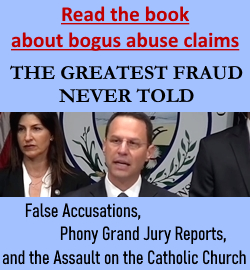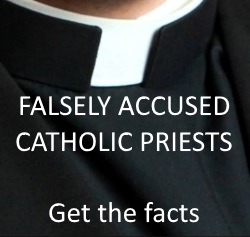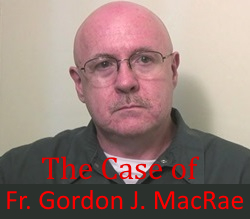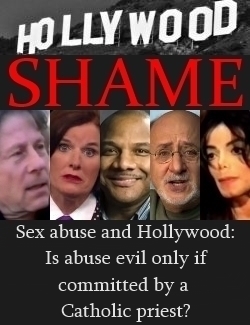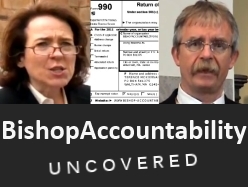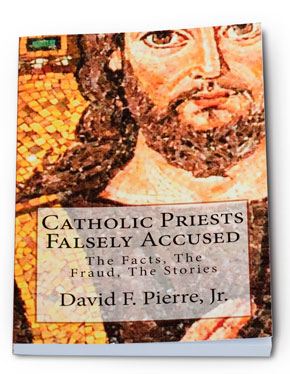The harm wrecked upon victims of sexual abuse is real and damaging. That is not an excuse, however, for reckless, false, and misleading reporting about Catholic Church officials. Take the egregiously wobbly op-ed from Monday's Los Angeles Times, "O.C.'s wayward bishop" (10/1/07). (For those of you outside California and unfamiliar with the TV show a couple of years back, "O.C." stands for Orange County.)
Contributing editor Gustavo Arellano goes after Bishop Tod Brown of the Diocese of Orange in California. Arellano perceives a lack of openness by Brown in reporting about sexual abuse in the diocese. But Arellano's premise falls completely flat in light of a flagrant disregard for honest facts and fairness.
1. Wrote Arellano (emphasis mine):
In Orange County Superior Court, church lawyers tried to seal a deposition [Diocese of Orange Bishop Tod D.] Brown gave for a civil lawsuit against the Orange diocese and its scholastic jewel: Mater Dei High School in Santa Ana. The plaintiff in the case, a former student, alleges that church officials ignored her abuse at the hands of a coach for Mater Dei's powerhouse boys' basketball program during the mid-1990s (the coach, Jeff Andrade, admitted to having sex with her).
Facts: Bishop Brown arrived to the Diocese of Orange in September of 1998. (Brown was previously Bishop of Boise, Idaho.) Mater Dei dismissed Andrade almost a year-and-a-half earlier, in April of 1997, after suspecting the assistant coach had a sexual relationship with the student. Police also investigated the case that same year. (The police did not file charges (source).)
In other words, Arellano implies that Bishop Brown "ignored [the] abuse" of a high school student in Southern California when, in fact, he was serving as a bishop several hundred miles away in another state!
2. There's more. Arellano misleads his audience again:
In Orange County Superior Court, church lawyers tried to seal a deposition Brown gave for a civil lawsuit … (snip) … Although [Los Angeles Cardinal Roger] Mahony fought being deposed for years, he didn't bother trying to seal his testimony like Brown did.
Arellano clearly implies that Bishop Brown wanted his deposition sealed in order to hide something about himself from the public. In fact, if one reads the actual deposition (pdf file), church lawyers were very clear that they were requesting a "temporary seal." They wanted time to review whether medical information about another church official (Monsignor John Urell, not accused of abuse) could be made public. (Church lawyers argued that they settled a case for $100,000 with Coach Andrade after he claimed "confidential information" about him was made public by the diocese. Lawyers didn't want a repeat of this from Urell.) (See pages 19-46 of the deposition.)
Even Times staffer Christine Hanley, in this article a couple of weeks back (9/14/07), reported that the temporary seal was directly related to Urell's private medical information and not anything to do with Brown himself. Arellano's implication is sunk by reporting from the very paper he's writing in! (By the way, the Diocese of Orange has also responded to this issue: "Clarification of Current Media Reports.")
More misleading by Arellano.
3. Arellano also wrote:
[Msgr. John Urell], by the way, was the Orange diocese's point man on sex abuse for more than a decade and was personally involved in the cover-up.
Cover-up of what? Up to this point of the article, Arellano does not elaborate about a "cover-up" of anything.
4. Arellano:
Depositions have continued for more than a year, yet none were more explosive than Brown's. In it, the bishop admitted that someone had accused him of sexual abuse while he was a priest in Bakersfield in the 1960s … For all of [Bishop Brown's] spinning and shuffling, even [Los Angeles Cardinal Roger] Mahony is better at repentance and transparency. When a woman in 2002 accused Mahony of abusing her, the cardinal cooperated with authorities and told the public about the ultimately baseless charge.
First of all, Cardinal Mahony told the public about the allegation only after stolen documents were given to radio station KFI and reported over the air.
(Shortly after the accusation was made public, Mahony's female accuser spoke with the Associated Press. The woman "offered no details of what she claims Mahony actually did." In addition, the AP wrote that the woman "said she is taking medication for depression and has been told by a psychiatrist that she is a paranoid schizophrenic. She said she could not remember many details of what happened" (source). An LA Times article reported, "[The accuser] also said that nearly everyone she has encountered in her life … had either molested, abused or emotionally mistreated her." Mahony fully cooperated with police, and in a matter of days, the case was closed. "We couldn't find a single thing to substantiate the allegations," [Fresno Lt. Dwayne] Johnson said.
(So in other words, a mentally ill woman claimed that Cardinal Mahony abused her, and the news was plastered on the front page of the Los Angeles Times and around news outlets throughout the country. Even Arellano admits that it was "an ultimately baseless charge." Regardless of what you think of the man: Was that kind of media attention fair to Cardinal Mahony?)
In the case of Bishop Brown, a man came forward in 1997 to say that Brown molested him in the Diocese of Fresno back in the 1960's. He did not make his claim public, and only in the past month has the man come forward publicly. In addition, the diocese told Hicks back in 1997, "We will strive to make confidentiality of this matter to the extent possible while conducting this investigation" (source, OC Weekly document).
This past Monday (10/1/07), the Orange County Register reported on the case (emphasis mine):
Fresno diocese officials deemed the accusation false.
[Scott] Hicks (the accuser) could not offer up anyone who could corroborate his story. He also did not tell anyone of the abuse at the time. He also says he has had multiple abusers, according to his Newport Beach attorney, Ryan DiMaria, who would not identify who they are.
…
[Fresno diocese] officials say they conducted several interviews of Hicks and others, and had the claim reviewed by a diocese sex-abuse board. Afterwards, the diocese found there "was absolutely no factual or credible basis whatsoever" to Hicks' story, according to a statement by the Rev. Jesse Avila.
Also notable: The accuser's allegation was the result of "a recovered memory pieced together after years of therapy." Added the Register:
University of California, Irvine Professor Elizabeth Loftus said Hicks' account raises a red flag because he only remembered what happened through therapy.
"False accusations often involve highly suggestive psychotherapy," said Loftus, a psychologist who specializes in memory. "You need to ask, where is the corroboration? Without independent corroboration, there is no way to know if a memory is real."
(Arellano, in the OC Weekly, first broke the story of this allegation back in April. His original article made no mention of the "recovered memory" element of the case. Also, when the LA Times published this lengthy article a couple of weeks ago (9/15/07), they, too, completely omitted mentioning this fact. The Times merely reported, "Hicks said he began discussing the episodes with a therapist about 1990 and decided eight years later to notify the Diocese of Fresno …"
(Also … In a recent blog post, Arellano wrote that Professor Loftus has worked for the Catholic Church. The correct response to this should be, "So what?" Doesn't the mere mention of the names "McMartin" and "Bernardin" precipitate legitimate questions about some forms of therapy? Surely Loftus is not the only psychologist out there that has the same concerns. In fact, some professionals have gone much farther than Loftus in their critical remarks about recovered memory. Here's something from a 1993 Time magazine article: "'Recovered-memory therapy will come to be recognized as the quackery of the 20th century,' predicts Richard Ofshe, a social psychologist at the University of California, Berkeley." Ouch!)
(NOTE: At this point of my article, people who don't like this will say I'm accusing Mr. Hicks of making a false allegation. I am not. I am merely reporting some information about this case that Arellano and other Times staffers haven't bothered to report.)
5. Arellano:
[Bishop Brown] never publicly disclosed the allegation [against him for sexual abuse] because it was "embarrassing."
In this case, Arellano clips one word from what the bishop stated in order to make Brown look bad. Here's Bishop Brown's full remark from the deposition:
BROWN: No, I never made a decision to divulge the allegation.
ATTORNEY JOHN MANLY: Why?
BROWN: Because it was very embarrassing, and very painful. And to be very honest, I think that kind of an allegation is difficult to deal with regardless of how innocent a person may be.
Bishop Brown comes across a little different now, doesn't he!
Bishop Brown's feelings are understandable. Back in November of 1993, in a nationally publicized story, Joseph Cardinal Bernardin of Chicago was accused by a man of abusing him when he was a seminarian. Similar in manner to Mr. Hicks in the Brown case above, the man claimed that the episode surfaced as a result of hypnosis during therapy. The man sued for $10 million. The cardinal was "humiliated" (his word) by the charge. It was a big story nationwide. CNN broadcast the story of the suit and included a tearful interview with the accuser. (source/source)
But, lo and behold, in February 1994, before dying of AIDS in 1995, the man stated, "I now realize that the memories which arose during and after hypnosis are unreliable." The man asked to withdraw his lawsuit. In other words: "Oops, I might have been wrong about my whole story. Sorry, bro'."
Yet "no matter how innocent a person may be," the accusation never leaves you if you're a Catholic priest. When Cardinal Bernardin passed away in November of 1996, the Chicago Tribune revisited the episode when they published a front-page memorial to him. ("Cardinal Joseph Bernardin 1928-1996: Chicago grieves a man of grace: His final days working to the end," Chicago Tribune, Nov. 15, 1996, page 1.)
Arellano's article illustrates that the mere accusation of abuse, even if it's totally "baseless," can still be reported years later, maybe even still after you've died, if you're a Catholic priest. Does Arellano doubt that something like that would be "very painful" and "difficult to deal with"?
+_+_+_+_+_+_+_+_+
Sadly, Arellano also has a record of taking cheap slaps at Christians.
For example, in an August 2004 article in the OC Weekly, Arellano bristled at Bible study groups in Orange County. A couple weeks later, a reader replied with a letter to Arellano that included, "Hey, lighten up—the Christians won’t hurt you!" Arellano snapped back:
[Y]our bit about "Christians won’t hurt you" must come as a comfort to the families of the reproductive-services workers murdered by fundamentalist Christians/snipers/bombers.
It goes without saying that even one such murder is unacceptable. But Arellano might want to know that there has been a grand total of ZERO murders of abortion clinic employees on the job in California. (Nationwide, the total is seven since Roe v. Wade passed 34 years ago.) I've addressed this kind of bogus reporting before, in this post.
In his weekly "¡Ask a Mexican!" column, Arellano is known to rightfully chide false stereotypes about Mexicans and Latinos. Yet when it comes to Christians, Arellano is not afraid to publicly spew an ugly, false, and mean-spirited stereotype.
Yuck.
+_+
In the same answer, Arellano retorted to another reader:
[M]y beliefs come from Catholic catechism school, where we learned the importance of Matthew 5:6-9, in which Jesus taught the disciples to "not be as the hypocrites are" and "when thou prayest, enter into thy closet, and when thou hast shut thy door, pray to thy Father which is in secret; and thy Father which seeth in secret shall reward thee openly."
Oops. There's no such passage in Matthew 5. It's in Matthew 6. (And for a young guy who says he attended "Catholic catechism school," it's a bit curious that Gustavo utilizes a King James Version for his citation. Hmmm. (Again, this is just a curiosity.))
+_+_+_+_+_+_+_+_+
Again – there has been terrible abuse committed by clergy, and the harm to victims has been simply awful. Meanwhile, Arellano attempts to portray Bishop Brown as a "wayward bishop" who "bumbles around like Fredo Corleone" while committing "cover-ups." Arellano's manipulation of facts and lack of honesty totally sink his presentation. Where's the fact-checker at the Los Angeles Times? Readers deserve much better.
Just a thought: If Arellano is genuine about shining the light on child abuse in this country, he might want to consider directing his energies toward the public school system. (This goes for any other journalist as well.) Here's Hofstra University researcher Carol Shakeshaft (emphasis mine) "[T]hink the Catholic Church has a problem? The physical sexual abuse of students in schools is likely more than 100 times the abuse by priests." In addition: "[A] 2002 Department of Education report estimated that from 6 percent to 10 percent of all students in public schools would be victims of abuse before graduation — a staggering statistic" (source).
Unfair reporting about Catholics at the LA Times? It wouldn't be the first time.
